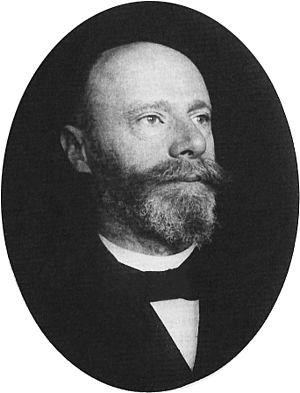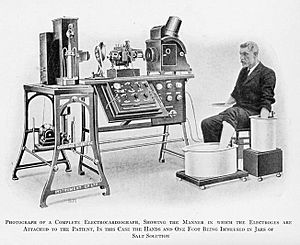Willem Einthoven facts for kids
Quick facts for kids
Willem Einthoven
|
|
|---|---|

Willem Einthoven in 1906
|
|
| Born | 21 May 1860 Semarang, Dutch East Indies
|
| Died | 29 September 1927 (aged 67) |
| Nationality | Dutch |
| Alma mater | University of Utrecht |
| Known for |
|
| Awards | Nobel Prize in Medicine in 1924 |
| Scientific career | |
| Fields | Physiology |
| Institutions | University of Leiden |
Willem Einthoven (born May 21, 1860 – died September 29, 1927) was a Dutch doctor and physiologist. He created the first useful machine to measure the heart's electrical signals. This machine is called an electrocardiograph, or ECG (also known as EKG). He invented it in 1895. For this important invention, he won the Nobel Prize in Physiology or Medicine in 1924.
Contents
Early Life and Education
Willem Einthoven was born in Semarang, a city on the island of Java in what was then the Dutch East Indies. Today, this area is known as Indonesia. His father was a doctor, but he passed away when Willem was a young child.
In 1870, Willem's mother moved back to the Netherlands with her children. They settled in the city of Utrecht. In 1885, Willem Einthoven earned his medical degree from the University of Utrecht. The next year, in 1886, he became a professor at the University of Leiden. He married his cousin, Frédérique Jeanne Louise de Vogel.
How Einthoven Studied the Heart
Before Einthoven's time, scientists knew that the heart produced tiny electrical currents when it beat. However, the tools they had were not good enough to measure these currents accurately. To get a good reading, they often had to place electrodes directly on the heart itself. This was not practical for studying people.
Inventing the String Galvanometer
Starting in 1901, Einthoven began working on a new device. He created several versions of what he called a string galvanometer. This machine was a big step forward. It used a very thin wire, like a tiny string, made of a material that could conduct electricity. This wire was placed between very strong electromagnets.
When the heart's electrical current passed through this thin wire, the magnetic field around the wire would make it move slightly. Einthoven then shone a light onto the string. This light cast a shadow of the string onto a long roll of photographic paper that was moving. As the string moved, its shadow drew a continuous line on the paper. This line showed the electrical activity of the heart.
The First ECG Machine
Einthoven's first string galvanometer was quite large. It needed water to cool its powerful electromagnets. It also required five people to operate it and weighed about 270 kilograms (around 600 pounds). Despite its size, this invention was amazing. It made the standard galvanometer much more sensitive. This meant it could measure the heart's electrical activity even through the body's tissues and bones. This allowed doctors to perform what is called transthoracic electrocardiography, meaning they could measure the heart's electricity from outside the chest.
Lasting Impact on Heart Study
Even though technology has created smaller and easier-to-use ECG machines today, many of the terms used to describe an ECG came from Einthoven. He gave the letters P, Q, R, S, and T to the different waves seen on an ECG reading. These letters are still used by doctors worldwide.
The term Einthoven's triangle is also named after him. This refers to an imaginary triangle on the chest. The points of this triangle are where the standard ECG sensors are placed on the arms and leg.
Later in his life, Einthoven also studied acoustics, especially the sounds made by the heart.
Recognition and Legacy
In 1924, Willem Einthoven received the Nobel Prize in Physiology or Medicine. This award recognized his invention of the first practical system for electrocardiography. This system became a vital tool for medical diagnosis.
On May 21, 2019, which would have been Einthoven's 159th birthday, he was honored with a special Google Doodle.
Images for kids
See also
 In Spanish: Willem Einthoven para niños
In Spanish: Willem Einthoven para niños
 | Kyle Baker |
 | Joseph Yoakum |
 | Laura Wheeler Waring |
 | Henry Ossawa Tanner |




